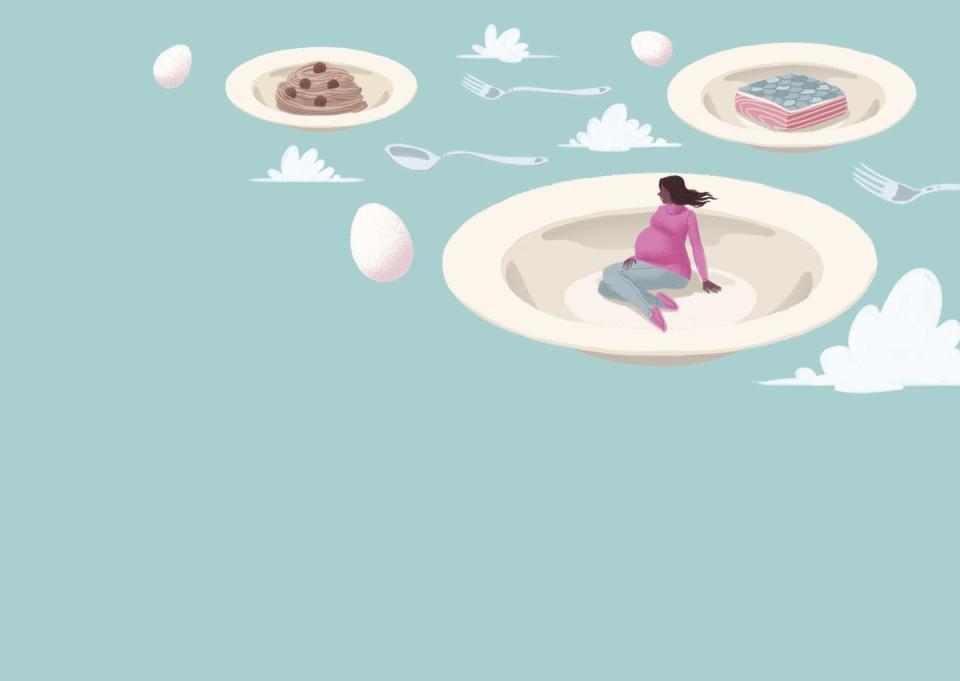5 Myths About Pregnancy We All Need to Stop Believing Right Now

Pregnant people may be among the most common recipients of misguided, if well-meaning, advice. (Parents are up there too!) Sometimes the things people say are relatively harmless, but there are plenty of assumptions that can lead to poor or at least unnecessary decisions about eating choices, delivery, and more. Here are a few myths that continue to be pervasive—let’s stop doling out these tropes and stick with well wishes instead!
Myth #1: You can tell the sex of your baby by how you’re carrying.
The truth: Baby-bump size, shape, and position have nothing to do with the sex of the baby, no matter how definitive Grandma sounds. Instead, how you carry is based on factors such as your height, weight, and abdominal muscle tone as well as the baby’s size and position, says Kecia Gaither, M.D., a maternal fetal medicine specialist and an associate professor of clinical obstetrics and gynecology with Weill Cornell Medicine in New York City. The number of pregnancies you’ve had plays a big role too: With a first pregnancy, your abdominal muscles are tighter and thus often hold the belly more inward, says Jennifer Lew, M.D., an ob/gyn at Northwestern Medicine Kishwaukee Hospital. In future pregnancies, though, you may show sooner and appear larger. Either way, the look of your belly is usually no cause for worry; if your doctor is concerned about the baby’s size, they’ll likely order an ultrasound to check that your pregnancy is progressing OK.
Myth #2: You’re more likely to have a C-section if you get an epidural.
The truth: “Having an epidural doesn’t mean a woman is more likely to have an operative delivery,” says Dr. Gaither. It’s been established in multiple studies that the risk of C-section doesn’t go up with epidural use, per a report in the journal Obstetrics & Gynecology. Instead, “epidural allows for a more restful labor that is not overwhelmed with pain,” says Dr. Lew. This myth might be tied to the fact that epidurals can shorten the first stage of labor and may lengthen the second stage, which might prompt interventions from medical staff (depending on your doctor or the policies of the hospital where you’re giving birth). The important thing is to choose a doctor you can talk to, no matter what your epidural preference. “Your birth may not go the way you planned, but to be able to trust and build the team you want around you is really critical in these situations,” says Kathryn Schubert, president and CEO of the Society for Women’s Health Research.

Myth #3: If you eat certain foods while pregnant, that can cause your baby to develop food allergies or asthma.
The truth: There’s no evidence that eating high-allergen foods like tree nuts, dairy, or eggs while pregnant or breastfeeding causes food allergies in kids, the National Institute of Allergy and Infectious Diseases reports. In fact, many of them are part of a healthy diet and needn’t be avoided, says Dr. Lew. Aim for “a well-balanced diet that includes a variety of foods…focusing on grains, fruit, vegetables, protein, fats, and dairy to ensure that all macronutrient and micronutrient needs are met,” says Myranda Vig, a registered dietitian nutritionist at UC Davis Health. You may be able to have a positive effect, however: Eating foods high in omega-3 fatty acids (salmon, chia seeds, mackerel) while pregnant may help lower your child’s allergy and asthma risk later in life, some research suggests.
Myth #4: You can’t eat lunch meat or hot dogs when you’re pregnant.
The truth: Hot dogs and deli meat aren’t automatically off the menu when you’re pregnant, but they must be heated to 165ºF, or steaming hot, according to the Centers for Disease Control and Prevention (CDC). That’s because of the risk of listeria, a germ that can sometimes be found in lunch meats and (more commonly these days) produce and unpasteurized dairy products. Listeria is the reason you shouldn’t eat soft cheeses like Brie or feta made with unpasteurized milk—especially while pregnant—and why you should wash your produce no matter what. And while listeria infections are not common, pregnant people are 10 times as likely to get listeriosis as other healthy adults because of changes to their immune system. Listeriosis may not even make a pregnant woman sick, but it can cause early labor, birth defects, and fetal death. So if you don’t want to heat up your deli cold cuts in the microwave, take a pass on them.
Myth #5: If you’ve had a C-section with your first delivery, you must have C-sections with your future ones.
The truth: The thinking on that has changed. “It used to be that if you had a C-section before, you’d automatically be scheduled for a C-section for subsequent pregnancies,” Schubert says. But in 2021, 14.2% of all births were vaginal births after C-section (VBAC), the CDC reports. That might not sound like much, but VBAC rates have been steadily ticking upward. Certain factors influence whether you will have a VBAC or another surgical delivery, including whether you had a vertical or horizontal incision the first time (a horizontal cut to the uterus has a less than 1% risk of rupturing if you give birth vaginally). You may be advised to have another C-section, however, if the reason you had one in the first place (such as a very large fetus) comes into play again, Dr. Lew says. You and your doctor will discuss your options throughout your pregnancy to figure out what’s best for you and the baby, she adds.
You Might Also Like

